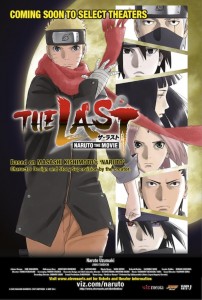WIT Life #283: Cape Nostalgia
WIT Life is a periodic series written by professional Writer/Interpreter/Translator Stacy Smith (Kumamoto-ken CIR, 2000-03). She starts her day by watching Fujisankei’s newscast in Japanese, and here she shares some of the interesting tidbits and trends along with her own observations.
I’ve been on the road for the majority of this month, and have been glad to escape the cold weather. Now that March is around the corner, hopefully temps will warm up and we can look forward to spring and sakura season! I was lucky enough to finish my business trip in Honolulu, which as usual was flooded with Japanese tourists, and took a vacation afterwards in Kauai, which was peacefully free from them. Before that my interpreting took me to Washington, Minneapolis and Portland, and I found plenty of fun Japanese influences along the way.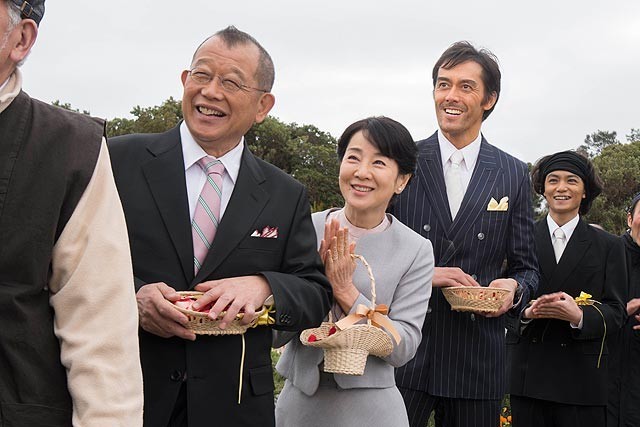
During my flight home from Hawaii I watched the film ふしぎな岬の物語 (Fushigi na misaki no monogatari) or Cape Nostalgia, which I have wanted to see since it came out at the end of last year in Japan and got rave reviews. It is based on a book by Akio Morisawa, and tells the story of a café situated along a small cape in Chiba that is run by an elderly woman named Etsuko Read More
Justin’s Japan: Nippon in New York — Ghibli Premiere, L’arc~en~Ciel, Steve Aoki, Rinko Kikuchi
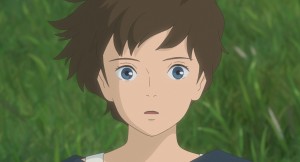
When Marnie Was There, the newest film from Studio Ghibli, premieres in North America Feb. 27 at DGA Theatre. (© 2014 GNDHDDTK)
By JQ magazine editor Justin Tedaldi (CIR Kobe-shi, 2001-02) for Examiner.com. Visit his Japanese culture page here for related stories.
Stay warm this winter with some hot local events, from an unmissable North American anime premiere, a documentary on one of Japan’s hottest acts, and concerts featuring some of the biggest names in electronic music, taiko, and indie rock.
This month’s highlights include:
Friday, Feb. 27, 8:30 p.m.
DGA Theatre, 110 West 57th Street
$16
North American premiere! The newest feature from Japan’s famed Studio Ghibli is a sweeping story of friendship, mystery, and discovery that delivers stirring emotions and breathtaking animation as only Ghibli can. When shy, artistic Anna moves to the seaside to live with her aunt and uncle, she stumbles upon an old mansion surrounded by marshes, and the mysterious young girl, Marnie, who lives there. The two girls instantly form a unique connection and friendship that blurs the lines between fantasy and reality. As the days go by, a nearly magnetic pull draws Anna back to the Marsh House again and again, and she begins to piece together the truth surrounding her strange new friend. Based on the novel by Joan G. Robinson, and directed by Hiromasa Yonebayashi (The Secret World of Arriety), When Marnie Was There has been described as “Ghibli Gothic,” with its moonlit seascapes, glowing orchestral score, and powerful dramatic portrayals that build to a stormy climax. In Japanese with English subtitles.
Sunday, March 1, 3:00 p.m.
Over the L’arc~en~Ciel: Documentary Films “World Tour 2012~”
Anthology Film Archives, 32 Second Avenue
$10
This new documentary follows a legendary rock band who never fear to take challenges on the international stage, when they have already reigned over the domestic music scene. L’Arc~en~Ciel, after celebrating their 20th anniversary, embarked on a massive world tour that no other Japanese rock band had ever done before. From March 3rd to May 31st, 2012, L’Arc~en~Ciel’s 14-city world tour hit Hong Kong, Bangkok, Shanghai, Taipei, New York, London, Paris, Singapore, Jakarta, Seoul, Yokohama, Osaka, Tokyo, and Honolulu with a total attendance of 450,000 people. The band became the first solo Japanese act ever to perform at Madison Square Garden. In Japanese with English subtitles.
Monday, March 9, 7:30 p.m. and 9:30 p.m.
Dizzy’s Club Coca-Cola, 10 Columbus Circle
$25, $15 students
Renowned Japanese pianist Chihiro Yamanaka is one of her native country’s most popular. Luckily for us, she recently moved to New York City. She’s especially well-known for leading trios, and with Jazz at Lincoln Center favorite Yasushi Nakamura on bass and rising star Kush Abadey on drums, this group stands up to those high expectations. On top of virtuosic, light-speed chops, Yamanaka has an irresistible bounce to her playing and writing.
For the complete story, click here.
Justin’s Japan: Nippon in New York — Kawaii Central, Japan Week, Mr. Big, the Last ‘Naruto’
By JQ magazine editor Justin Tedaldi (CIR Kobe-shi, 2001-02) for Examiner.com. Visit his Japanese culture page here for related stories.
Stay warm this winter with some hot local events, from an exhibition for the whole family that’s perfect for introducing kids to Tokyo life, a big-screen anime farewell to a certain ninja you won’t want to miss, and an annual showcase that brings the sights (and tastes) of Japan to vivid life.
This month’s highlights include:
Now through May 17
Children’s Museum of Manhattan, 212 West 83rd Street
$11 children/adults, $7 seniors
Experience Tokyo’s vibrant culture in a new interactive exhibit! Children will have fun learning about life in present day Japan in this playful, highly immersive environment that transports families to two distinct areas of Tokyo that exist side by side: one serene and exquisite, the other, too cute for words. Kawaii Central is a streetscape inspired by Tokyo’s bustling Harajuku district, bursting with color, trendy shops and cuter than cute styles. Kids sing karaoke, smile for the photo booth camera, serve up a seasonal Japanese meal, and design adorable mascots for their families. Plus, learn more about contemporary Japan through special programs for the public, free with admission.
Jan. 29-31, 7:30 p.m.
Miwa Yanagi Zero Hour: Tokyo Rose’s Last Tape
Japan Society, 333 East 47th Street
$35, $28 Japan Society members
Stranded in Japan during World War II, a young Japanese-American woman was forced to serve as a radio broadcaster for a propaganda program controlled by the Japanese Imperial Army, and was subsequently tried for treason. Seventy years later, this historic incident is brought to life through a visually stunning whodunit, conceived, written and directed by internationally renowned visual artist Miwa Yanagi. Brimming with iconic imagery from her rich body of photographic work, Zero Hour tells the multi-layered story of a woman caught between two nations during the war. This presentation marks Yanagi’s North American debut as a theater artist. Performed in English and Japanese with English subtitles.
Feb. 7-8
Music from Japan: East Asian Vibrancy and Highlights of MFJ Commissions III
Asia Society, 725 Park Avenue
$20-$40
Over two days, Music from Japan’s 40th anniversary will be commemorated with exciting cross-cultural collaborations between musicians from Japan and its neighboring countries, China and Korea. Three internationally acclaimed traditional instrumentalists from Japan, Korea, and China will perform contemporary and classical repertoire on their respective instruments. A series of solo works will be followed by a group improvisation and the world premiere of Unkai (Sea of Clouds), written by MFJ-commissioned composer Ned Rothenberg especially for the occasion. The following afternoon, to celebrate MFJ’s long history of commissioning Japanese and American composers to create new work, two new MFJ commissions will be presented alongside a retrospective of compositions from prior years.
For the complete story, click here.
WIT Life #279: 東京家族
WIT Life is a periodic series written by professional Writer/Interpreter/Translator Stacy Smith (Kumamoto-ken CIR, 2000-03). She starts her day by watching Fujisankei’s newscast in Japanese, and here she shares some of the interesting tidbits and trends along with her own observations.
I can’t believe I haven’t posted here in over a month, though I think I know part of the reason why. Last month TV Japan offered a free two-week viewing period of its programming for non-subscribers. During this time I got used to watching this 24-hour Japanese channel, particularly its wide array of news shows that are really useful for learning vocabulary for interpreting. The service is through NHK Cosmomedia America, and will be very familiar to those of you who followed NHK’s programming in Japan. There are multiple daily news shows, including internationally focused ones and one I really like called Today’s Close-Up (現代クロースアップ) which takes a deep dive into a particular subject. For $25 a month you can be immersed in the world of Japan, so I immediately became a subscriber when the trial period ended (TV Japan is offering a $50 rebate if you sign up before the end of the year and maintain your subscription for at least three months!). I’ve not only been studying via the news but also getting back into Read More
Rafael Villadiego (Nagasaki-ken 2010-2013) writes for Green Tea Grafitti and reviews Tokyo Tribe.

Rap battles with actual battle
In a dystopian, not-so-distant-future Tokyo that has fallen into urban decay, young thugs rule the streets and the disparate districts have been divided between the various gangs that hold sway over their respective neighbourhoods. There is an uneasy alliance between these tribes as long as each adheres to the unspoken truce of keeping out of each others’ allocated territory.
But none of the tribes are entirely satisfied with maintaining the status quo and are chomping at the bit to prove their superiority and expand their sphere of influence.
All this teetering tinder box needs is a spark to push it completely off the edge and set the entire thing on fire.
Enter Mera (Suzuki Ryohei), leader of the ‘Bukuro Wu-Ronz, who is seeking to finally settle an old score with the Musashino Saru’s, Kai (rapper Young Dais). Mix in the insane Yakuza boss Big Buppa (Takeuchi Riki) and the kung-fu kicking virginal daughter of an international crime lord, Sunmi (Seino Nana), and you have all the ingredients for one unforgettable night through the myriad maze of this doomed metropolis, where all the simmering tribal rivalries are finally set to boil over.
Who will win the war for the streets of Tokyo? Plug in the speakers, pump up the volume and strap in for one epic ride.
The inimitable Sono Sion is back with a hybrid hip-hop, musical, gangster battle epic that defies easy categorisation or description. Over-the-top to the point of parody, this film will either provide an entertainingly rollicking departure from standard cinema fare, or turn viewers off entirely. Replete with a mish-mash of genre cliches and tongue-in-cheek references to classic Hollywood and Japanese cinema. In short, it is exactly what the seemingly ludicrous blurb of the film promised. Yet some people still had the audacity to get-up and leave – obviously not realising just what they had signed up for.
Our guide to the evening’s festivities is MC SHOW (embodied by Sion Sono alum Sometani Shota) who sets the stage for this sprawling rap narrative in what is shapes up to be one heck of a ride through an alternate Tokyo where gangs rule the streets and anything goes. The only rule is that you don’t cross into another gang’s turf. But this turns out to be the night when rules are meant to be broken, which just might ignite an all-out war that will set the streets of Tokyo alight.
The storyline is paper-thin, but the narrative is carried forward on sheer energy, lyrical verve and musical drive. With references to old-school yakuza gangster flicks, Broadway musicals and underground “pinku” cinema, the film offers a veritable smorgasbord of z-grade schlock and kitschy action extravagance. Populated by a veritable who’s-who of old-school Japanese hip-hop and rap royalty, led by Young Dais, the majority of roles are filled by street-level, non-actors ranging from tattoo artists to stunt performers. Despite lacking requisite thespian credentials, they are instead fully versed in the world Sion is attempting to create, lending an air of authenticity to the work and lyrical legitimacy to the rhymes.
The lyrics themselves range from street-level swagger to the scintillatingly surreal, to the downright hilarious. Are these wannabe posers or veterans so far above the game they are willing to poke fun at their own expense? There are moments when one cannot be entirely certain. But it is clear that these indisputable artists are fully committed to the cause and believe unequivocally in the unfolding struggle.
There are some mind-boggling action sequences drenched in veritable buckets of blood all captured in sweeping single-take shots that fully immerse you in this sprawling epic. It certainly reaches a point where style and artifice well and truly rule over any form of substance. So if you are looking for a deeper statement on the human condition or an underlying message amidst all this madness, you may find yourself disappointed.
But if you are happy to check your brain at the door and fully immerse yourself in Sion Sono’s insane symphony, then plug yourself in and raise your fists high as you cheer on the love and peace of the Musashino Saru in their struggle to prevail against the all-out-mayhem declared by the warlike Waru.
At the close of the film, we eventually discover the idiosyncratically innocuous circumstance that set the entire war in motion, and you will either laugh or cry – or more than likely, both.
Watch this film if…
…you are hankering for rap infused, hip-hop action epic through the streets of Tokyo…
“Tokyo Tribe” (Tokyo Toraibu) was released August 30 2014 in Japan, starring Suzuki Ryohei, Young Dais, Seino Nana, Sato Ryuta, Kubozuka Yousuke, Takeuchi Riki, Sometani Shota.
Justin’s Japan: Nippon in New York — Takashi Murakami, Studio Ghibli Documentary, Japan Society Party

See Takashi Murakami: In the Land of the Dead, Stepping on the Tail of a Rainbow at the Gagosian Gallery through Jan. 17. (Kaikai Kiki Co., Ltd. All Rights Reserved.)
By JQ magazine editor Justin Tedaldi (CIR Kobe-shi, 2001-02) for Examiner.com. Visit his Japanese culture page here for related stories.
With Thanksgiving (and the hopes of sensible eating) now just a memory, we turn to colder weather, falling snow, and the new year to come. Fortunately for Japanese culture fans, December is just as busy as the holiday season itself. Whether you’re hosting guests from out of town or looking to squeeze in an event or two in between parties, we’ve got you covered.
This month’s highlights include:
Now through Jan. 17
Takashi Murakami: In the Land of the Dead, Stepping on the Tail of a Rainbow
Gagosian Gallery, 555 West 24th Street
Free
Since the devastating Great Tōhoku Earthquake of 2011, prolific contemporary visual artist Takashi Murakami has explored Japanese art produced in response to historic natural disasters. Combining classical techniques with the latest technologies, he moves freely within an ever-expanding field of aesthetic issues and cultural inspirations. Mining religious and secular subjects favored by the so-called Japanese “eccentrics” or non-conformist artists of the Early Modern era commonly considered to be counterparts of the Western Romantic tradition, Murakami situates himself within their legacy of bold and lively individualism in a manner that is entirely his own and of his time.
Friday, Nov. 28
The Kingdom of Dreams and Madness
IFC Center, 323 Sixth Avenue
$14
New York premiere! Granted near-unfettered access to the notoriously insular Studio Ghibli, director Mami Sunada follows the three men who are the lifeblood of Ghibli—the eminent director Hayao Miyazaki, the producer Toshio Suzuki, and the elusive and influential “other director” Isao Takahata—over the course of a year as the studio rushes to complete two films, Miyazaki’s The Wind Rises and Takahata’s The Tale of The Princess Kaguya. The result is a rare “fly on the wall” glimpse of the inner workings of one of the world’s most celebrated animation studios, and an insight into the dreams, passion and singular dedication of these remarkable creators.
Wednesday, Dec. 3, 9:00 p.m.
Midnight in the Garden of Unearthy Delights Party
Japan Society, 333 47th Street
$25/$20 Japan Society members (until Dec. 2, $30/$25 afterward)
Japan Society Gallery serves up an exclusive after-dark soirée for patrons to escape into the wildly imaginative virtual gardens of its hit exhibition, Garden of Unearthly Delights: Works by Ikeda, Tenmyouya & teamLab. Sip some wine, beer, or a signature sake cocktail concocted just for Japan Society by JET alum Chris Johnson (Oita-ken, 1992-95), one of the country’s foremost experts on sake; enjoy the swinging sounds of jazz quartet The Red Birds + Francesco Ciniglio followed by the beats of DJ Aki til midnight; dig deep into the Garden with specially themed expert guided tours available all night; satisfy your sweet tooth at our dessert bar featuring tasty treats, fruits, and cheeses; and more! All food and drinks are covered by the cost of admission. Participants must be 21 years old or over.
For the complete story, click here.
JQ Magazine: Film Review — ‘The Kingdom of Dreams and Madness’
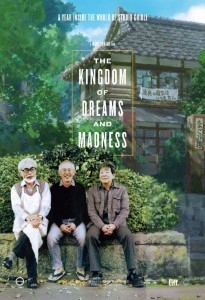
“Although beautiful and carefully crafted, in the end this work is one that ushers you into a new era of Ghibli by giving you a bittersweet goodbye.” (GKIDS/TIFF/© 2013 dwango)
By Alexis Agliano Sanborn (Shimane-ken, 2009-11) for JQ magazine. Alexis is a graduate student of Harvard University’s Regional Studies—East Asia (RSEA) program, and currently works as an executive associate at Asia Society in New York City.
The Kingdom of Dreams and Madness is a documentary following animation director Hayao Miyazaki during his last months at Studio Ghibli. Centering on the production arc to The Wind Rises, Miyazaki’s final and most controversial film, it offers a unique glimpse into the fading days of Studio Ghibli with Miyazaki at the helm.
The film is directed by Mami Sunada, a former assistant director on Hirokazu Kore-eda’s films. Although the documentary does not detail the advent of the unprecedented behind-the-scenes access, from its beginning Sunada and Miyazaki share a tacit understanding that his film straddles a nebulous period. It is the beginning to the end of an era. As Miyazaki admits unreservedly, “I’m a man of the 20th century. I don’t want to live in the 21st.” This documentary captures his twilight world.
Fading though Studio Ghibli may be, it is still a place where one anticipates a world not beholden to reality. What one finds is an atmosphere entrenched in the daily slog. There are deadlines to be met, decisions to be made, marketing, budgeting, and finances that throw the project for a whirl. It is a work place like any other. Somewhat unromantic.
Yet, just like the Ghibli films themselves, this documentary captures the beauty of the everyday. It is there we find appreciation, meaning and relevance through details and rituals. For Miyazaki, these include greeting kindergarteners on their way to school, going up to the rooftop to “watch the sky,” or even the small cheerful doodles pinned about the office with inspirational messages. These simple elements stitch the work into something meaningful.
Eden Law (Fukushima-ken ALT 2010-2011) reviews My Little Sweet Pea, a film of the haha-mono genre, or “mother stories”. Guaranteed to make you call your mum and if not, you’re either an orphan or dead inside.

Why haven’t you called your mother yet?
“My Little Sweet Pea” is a genre film, one that is quite an old trope in Asian cinema, that of the self-sacrificing maternal figure who patiently bears all the insults and trials (usually originating from her family or ungrateful children), until finally her passing or fatal illness causes her former tormentors to repent their evil ways and express remorse in a climax of tears and self-blame. In Japan, it’s known as haha-mono or “mother stories”, and it’s an enduringly popular style of melodrama (my mother loves them to the point of identifying with the main character, and I don’t know what that says about me).
In this particular entry however, the mother character is not the main focus, but one of her children – her daughter Mugiko. Mugiko and her brother Norio have lived together since their father died, until one day their absent parental unit, Ayako, suddenly shows up, asking to move in, after having being missing for almost all of their lives. Begrudgingly, they allow her in, although Norio disgustedly moves out, leaving his sister alone with their mother. Mugiko subjects her mother to all sorts of nasty, unfilial treatment, before Ayako suddenly passes away from an unrevealed terminal cancer. As per custom, Mugiko has to travel to her mother’s home town to bury her ashes, which sparks a journey of discovery, of herself and the mother that she had never known.
Western tastes might find this kind of movie to be a tad over the top, as the mother character is by necessity, almost a caricature in how inhumanly compassionate and submissive she is – obviously she’s meant to elicit as much sympathy from the audience as possible while at the same time whipping up the accompanying feelings of indignation to such a frenzy that only an appropriately melodramatic or tear-soaked climax would suffice. But while “My Little Sweet Pea” ends the way you’d expect, it’s luckily a little more subtle in its emotional manipulation. As the audience explores Ayako’s past alongside with Mugiko, and as Mugiko gradually comes to realise and empathise with her mother, we also come to sympathise with the errant prodigal child, so that her emotional realisation and remorse is all the more touching and moving than it would have been, had we just simply hated her for being a bitch instead. Horikita Maki does very well in this regard in conveying a character that the audience could have disliked intensely, and she also does double duty in playing both the daughter and the mother (in her younger years).
“My Sweet Little Pea” still has its over the top moments, but it is also unexpectedly humourous in parts, allowing a deeper level of emotional complexity beyond “angry” and “crying”. A tear-jerker, it is nonetheless enjoyable and will make you feel the urge to call up your mum or hug her to apologise for being the brat that you most certainly were.
My Little Sweet Pea (Mugiko-san to) by Yoshida Keisuke, released December 21 2013 in Japan, starring Horikita Maki, Matsuda Ryuhei, Yo Kimiko, Nukumizu Yoichi, Asou Yumi.
Eden Law (Fukushima-ken 2010-2014) reviews one of the smaller films of the 18th Japanese Film Festival, “The Piano in the Shed”. The producer Yuto Kitsunai, made a surprise appearance at the screening of this film in Sydney. Created by the people of Kori, Fukushima, this is truly a labour of love.
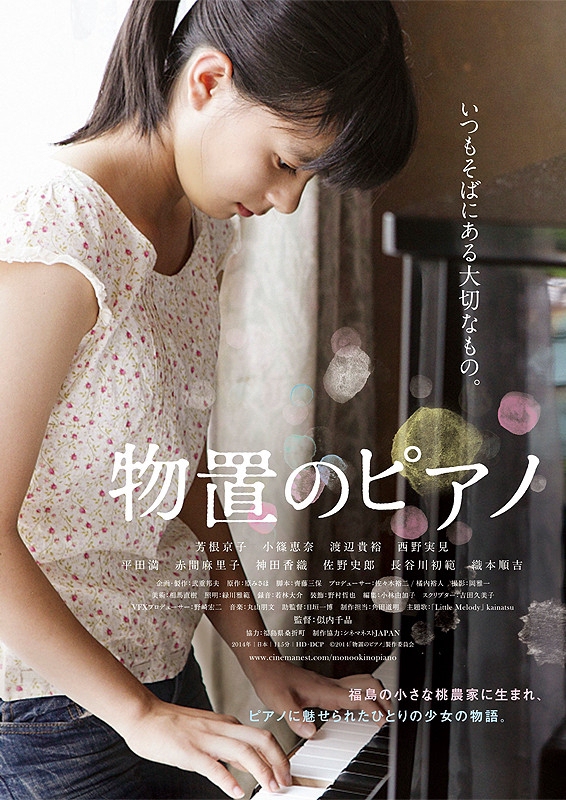
The Piano in the Shed
“The Piano in the Shed” is a coming-of-age story, centred around Haruka, a final-year senior high school student in the town of Kori, a rural town in Fukushima, in her last summer break during the final years of her senior high school years. Quiet and withdrawn, she is happiest only when playing the family piano in the shed, her place to escape from life and its troubles, which includes the loss of a younger brother, whose death still continues to affect the family, but especially her grandfather, who blames himself for the tragedy. Into all this two further pivotal events occur: her older sister, Akiha, comes back from Tokyo to stay for the summer, stirring up Haruka’s long-held resentment of the attention-seeking, prettier and more popular sibling. The other, far more happier, is the promise of a first romance with Kosuke, recently relocated from the contaminated zone.
There will perhaps be very few other films about Fukushima post 3-11 that wears its heart on its sleeve so openly and earnestly. Like the other film related to Fukushima in this festival, “Homeland”, “The Piano in the Shed” is more focused on telling an emotional story rather than making a critique of the prevailing political and social issues. For the film’s scriptwriter, Hara Misaho, this is clearly a very personal project – both her and the director, Natanai Chiaki, hail from Kori, where the film is set. And by choosing to tell the story from young Haruka’s point of view, they show how the youth can be emotionally affected, just like their elders, forced to cope with the ever present feelings of anxiety and worry that are now an unfortunate part of everyday life. Haruka’s uncertainty about her future after graduation reflects the broader, general uncertainty – for young people like herself from Fukushima, for evacuees like Kosuke and his father, constantly on the move for jobs and shelter, and for the future of farming communities that cannot sell their produce to a frightened and paranoid public, as Tokyo forgets and continues the status quo, while frustrated local councils continue to hold meetings about “reconstruction”, a sloganistic message that seems increasingly pointless and empty.
The human story here, from the aspect how the young are coping with the new reality in the wake of the disaster, is certainly a very compelling one. Other subplots such as Haruka’s family tragedy, and her rivalry with her sister, are less successful or not as well-developed by comparison, and could probably have been dropped in order to make the film feel more cohesive and less derivative. But the young actors are lovely to watch (though at the expense of the adults, who, with the exception of the grandfather, are rather less developed). Yoshine Kyoko is the same age as the character she plays, giving Haruka a level of convincing authenticity to her shyness, and her touching selflessness and unexpected strength for someone so young.
As mentioned, there is no denying the amount of emotional heart and soul poured into this film by its creators. Often included are footage of slice-of-life scenes of the town and its people, whether participating in their annual summer festivals, or going about their daily lives. The film’s ultimate positive note conveys the filmmakers’ message: Kori, and places like it, and the people who live there, should not be forgotten, and they will find a way to endure and survive.
The Piano in the Shed (Monooki no Piano) by Natanai Chiaki, released February 9 2014 in Japan, starring Yoshine Kyoko, Koshino Ena, Hirata Mitsuru, Akama Mariko, Hasegawa Hatsunori, Imai Yuto, Kanda Kaori, Orimoto Junkichi.
By Rafael Villadiego (Nagasaki-ken 2010-2013), also available on Green Tea Grafitti.

Maiko wa Laaaaady
A comedic, Broadway-musical reworking of Audrey Hepburn’s classic My Fair Lady, wrapped in the traditional trappings of geisha and maiko regalia. Set amidst a backdrop of a contemporary Kyoto transitioning between the golden recollections of the past and the everyday realities of the present.
Taking place in the unobtrusive little corner of Shimohachiken – that was once an illustrious geisha district in its heyday, but has since fallen on hard times – it still seeks to uphold the old tea house traditions by maintaining at least one maiko in their district. Unfortunately, that maiko, Momoharu (Tabata Tomoko) is pushing 30 and longs to be released from her unfair restrictions and graduate into a true geisha.
Enter Haruko (Kamishiraishi Mone), a naive young country girl with her head full of dreams of becoming a geisha. After discovering a photograph of her late mother dressed as a maiko in her youth and reading Momoharu’s hapless blog, she eventually decides to leave her adoptive grandparents behind and make the journey to Bansuraku Teahouse in Kyoto. But, having no formal introduction or letters of recommendation, and plagued with a backward north-south country bumpkin accent, the odds seem stacked against her.
However, she is taken under the wing of local college linguistic specialist, Professor Kyono (Hasegawa Hiroki) who makes a friendly wager with another regular tea house patron Kitano (Kishibe Ittoku) that he can transform Haruko into a top notch maiko.
What follows is a singing and dancing extravaganza as a colorful cast of characters unfold all the pomp and circumstance of a Broadway musical, with a decidedly Japanese twist.
Veteran director Suo Masayuki of Shall we dance? fame returns to the fore with this whimsical musical confection that is sure to delight fans of musical theater. It is also a fine diversion for linguists of regional Japanese dialects or scholars of traditional geisha culture. In fact, Suo is a dedicated auteur of authenticity who offers delightfully disguised lessons in language, culture and tradition. Approaching his subject matter with gusto and treating it with the utmost reverence and respect – he also shows that he is more than willing to have some fun along the way.
Offering an exuberant display of traditional Japanese dance fused with western Broadway musical sensibilities, the film feels almost like an oxymoron, with its improbable mix of genres and styles. But somehow this unique juxtaposition just seems to work, as it sweeps audiences along on sheer energy and exuberance.
There is one particular musical number which plays perfectly on the classic lines of “The rain in Spain stays mainly in the plain”, but with a Japanese slant that more than makes it its own.
At the heart of this film is a classic underdog story, where if you are willing to try your best and weather the odds, you can overcome whatever comes your way and ultimately succeed. This is Haruko’s story, and we are invited along to share in her journey of discovery as we take a behind-the-scenes glimpse into the rarefied world of geisha and maiko culture.
In this regard, director Suo was fortunate to secure the services of newcomer Kamishiraishi Mone. Beating out 800 other applicants in the Toho Cinderella Contest, 16-year-old Kamishiraishi is quite a find and more than holds her own amongst the veteran cast in the demanding song and dance routines. We glimpse this world for the first time through her bedazzled eyes, with all the characters poised to perfection, the costumes colorfully coiffed and the sets exquisitely appointed.
But despite these elaborate production values, soaring songs and dazzling dance routines, there was just something missing that stopped the film from coming entirely together for me. It is hard to put my finger on exactly what was lacking. I am usually a sucker for a good song and dance, yet something prevented me from being swept off my feet completely. Perhaps the narrative around the musical was not as strong or believable as I would have hoped, to live up to the sheer exuberance on show. A fantastical confection, light as a feather, that possibly lacked the necessary substance to keep it grounded. The eventual low after the high.
Like a dream on waking.
Lady Maiko (Maiko wa Lady) by Suo Masayuki, released September 13 2014 in Japan, starring Kamishiraishi Mone, Hasegawa Hiroki, Fuji Sumiko, Tabata Tomoko, Kusakari Tamiyo.
Eden Law (ALT 2010-2011 Fukushima-ken) reviews one of four Fukushima-related films in the 18th JFF. A fun fact: Homeland was partially filmed in the city of Iwaki, where he lived and worked as a JET. It’s good to hear the Tohoku dialect ringing in one’s ears once more!

Heck no, we won’t go!
The spectre of nuclear contamination from the 2011 catastrophe in Fukushima casts a dark and long shadow in “Homeland”, as a rice farmer (Soichi), his wife (Misa) and child, and his mother (Tomiko), struggles to cope after being forced to evacuate from their farm. Meanwhile, his estranged younger brother (Jiro) secretly returns to the forbidden zone and begins to tend to the ancestral home and lands, preparing the fields to plant traditional crops. It’s a quiet, meditative, at times slow film, though tensions simmer below the surface, and while the film’s focus is mainly on the human drama, much of the cause of that drama comes from the worries and issues that evacuees still face, three years on after the worst natural (and arguably man-made) disaster in Japanese post-war history.
Director Kubota’s first feature film (he had been a maker of documentaries before this) is also one of the first released for the Japanese domestic market that focuses on the lives of evacuees. Considering that the credits list special support from acclaimed directors Koreeda Hirokazu and Suwa Nobuhiro, this is probably a problematic topic for a movie in Japan right now, and therefore needed all the help it can get to be made. And it’s certainly not a pleasant reality that’s being depicted: the living conditions in temporary housing are cramped and impersonal; jobs, for people with no other career than farming, are scarce, living them with endless days and stupefying boredom (though Misa resumes her pre-marriage career as an escort), and the Soichi worries about the discrimination their daughter might face when she grows up. The refugees experience a sense of restlessness and hopelessness, feeling abandoned by the government. Some reviews of the film have criticised it for not taking a harder, clearer stance on social and political issues, but considering the depiction of hardships these characters face, it would be unfair to accuse it of whitewashing or ignoring the problems that people like Soichi and his family face.
The performances in “Homeland” are quiet, just like the film, with most of the heavy lifting concentrated in the roles of Soichi and Jiro, though Tanaka Yuko’s performance as the increasingly addled and distracted Tomiko, is heartbreaking to watch. And though Kubota somehow was able to film some of the scenes in the movie in the main streets of actual abandoned towns in Fukushima, for the most part the movie looks pretty pedestrian and staid, and would have benefited from a director more experienced in dramatic framing.
However, what Kubota intended to show is the human emotional state and reaction to the disaster, rather than exploring anything ideological, and in this he is largely successful. There is a yearning by displaced souls, caught in perpetual transit, for a home, to retain their dignity and also, to assuaged a collective sense of guilt for fleeing their ancestral homes. Jiro’s actions, in persistently living and farming on contaminated land, is definitely foolhardy and ill-advised, but one can understand the resolve and resilience of his spirit, seeking to triumph regardless of the odds, to quietly rebel against the government in a way, by not abandoning a place that so many others have. A film like “Homeland” is still important, if it means keeping alive in the nation’s consciousness, the lot of the abandoned and the lost of Fukushima.
Homeland (Ieji) by Kubota Nao, released March 1 2014 in Japan, starring Matsuyama Kenichi, Uchino Masaaki, Tanaka Yuko, Ando Sakura and Yamanaka Takashi.
From the biggest Japanese film festival in the world, Eden Law (Fukushima-ken ALT 2010-2011) reviews an anthology from the most exciting names in Japanese anime at the moment.

Short and sweet.
Four short films (short pieces?) make up this anthology, an unashamed and exuberant exercise in creative muscle-flexing as some of the biggest names in anime take the helm: Shuhei Morita (“Possessions”), Katsuhiro Otomo (“Combustible”), Hiroaki Ando (“Gambo”) and Hajime Katoki (“A Farewell to Weapons”). In addition, a video game was released as part of this multimedia project, “Short Peace: Ranko Tsukigime’s Longest Day”.
“Plot” or “theme” is pretty loosely applied to Short Peace. Apart from sharing the same general vicinity, located somewhere not too far from Mt Fuji in central Japan, there is no connective narrative and each stands alone as a separate piece. They take place in different time periods of Japanese history, from ancient days to a post-apocalyptic future. The pieces are best enjoyed and experienced for their visual impact rather than for any story, for there is very minimal setup or backstory, and the term “style over substance” is vigorously embraced. Some backstory however, would have been useful, in order to make sense and provide context for the setting and events of some of the shorts.
Each director are wildly different in how they chose to tell their tales. The first chapter, “Possession”, is about an itinerant craftsman of sorts who, seeking shelter in a derelict and forgotten shrine from bad weather, finds himself assailed on all sides by tsukumogami, an endearing type of mischievous spirits or monsters formed from unwanted household objects. The use of CG is more overtly apparent, in the blocky design of the main character, and the technology’s usefulness in animating gorgeous detail is fully utilised, resulting in richly designed origami and textiles patterns filling the screen. This short was nominated this year for Best Animated Short category at the Academy Awards, and it’s not hard to see why: apart from its animation, the short has a fable-like quality in its story-telling, as the tsukumogami bemoan their lot, of being callously discarded after years of faithful service and so take out their frustrations on the lone mortal who have strayed into their world.
“Combustible”, the second chapter, is a love story between two young people whose families are neighbours. Forced apart by duty and social convention, they are reunited by the threat of a blaze that rages out of control in their block, a common and deadly hazard in the days of largely wooden cities. This piece draws more heavily on Japanese cultural heritage than the first, as it opens, quite literally, like a fine scroll painting, and simply looks stunning, departing radically from the usual anime style. Another fascinating aspect is the depiction of Japanese firefighting, which looks like a faithful recreation of real historical accounts and techniques. “Combustible” won several awards, like the Grand Prize at the 16th Japan Media Arts Festival and was also nominated for the Academy Awards for animation short last year.
In “Gambo”, the third chapter, a white bear comes to the rescue of a young girl against a giant demon that has been killing the men and kidnapping the girls. Incorporating several elements – the demon’s off-world origin is hinted at, and an injured samurai wears a crucifix – this is a dark and brutish short. The gore and violence is depicted graphically and copiously, and the animation style is coarse and thick, all in contrast to the elegance of the second chapter and the playfulness of the first. With its slightly cheesy dialogue delivered earnestly, and one-word-title film, It feels like a 70’s slasher-exploitation one-word-title film, as if children’s anime like the concept behind “Kimba” was given a radical adult makeover.
In the last, “A Farewell to Weapons”, what looks to be a mobile scavenging unit scours the ruins of a city looking for weapon supplies, and finds itself battling a superweapon, a leftover relic from some unknown war. It starts off a little bit “Top Gun” as the opening montage establishes the stereotypical character types common to every war film (the grizzled leader, the nerd, the lazy rebel, the guy who has dreams of a normal life after the army and who you just know would be the first to die, etc etc), but once into the action, Hajime Katoki’s experience from working on a lot of mecha-based anime (like “Patlabor” and “Gundam”) comes to the fore, creating some of the most exciting man-vs-machine combat sequences I’ve seen in a long while. The thought and attention put into thinking up possible methods of modern warfare and weaponry gives it an unexpected sense of realism, like some sort of futuristic “Hurt Locker”. The ending however, is rather anti-climatic, and while comical, seems a bit unsatisfying and slightly misjudged, given the tone that had been established.
“Short Peace”, despite some flaws, is a hugely enjoyable demonstration of animation and creative style. A welcome change from the usual uniformity of technical execution that dominates a lo of anime fare these days, and a strong powerhouse performance from Japan’s best.
“Possessions” by Shuhei Morita, “Combustible” by Katsuhiro Otomo, “Gambo” by Hiroaki Ando and “A Farewell to Weapons” by Hajime Katoki.
JQ Magazine: The 18th Japanese Film Festival — More Films, More Countries
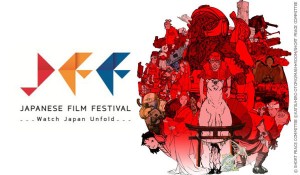
The 18th Japanese Film Festival. Better than any other Japanese Film Festival in the Northern Hemisphere except Japan. (Courtesy of JFF)
By Eden Law (Fukushima-ken, 2010-11) for JQ magazine. Taking full and outrageous advantage of being a JETAA member, Eden returns again this year to watch and review the 18th Japanese Film Festival, now covering both Australia and New Zealand, with more films than ever. It’s so big that both himself and Rafael Villadiego (Nagasaki-ken, 2010-13) will shoulder the burden of covering this, the biggest and best method of (legally) watching Japanese films outside of Nippon.
The 18th Japanese Film Festival continues in Auckland (6-12 Nov), Sydney (13-23rd Nov) and Melbourne (27 Nov-7 Dec).
The 18th Japanese Film Festival became a pan-Oceanic film festival this year with the inclusion of New Zealand, making it the largest Japanese film festival in the world. The program includes over 60 films, some of which have barely just made it to the movie theatres in Japan, such as Samurai of the Dead, Japan’s action-packed foray into zombie lore, mixed with the historical legend of the Shinsengumi. And speaking of a connection to that famed group, the guaranteed draw card would be the Rurouni Kenshin trilogy, shown in their complete collection for the first time. The live-action adaptation of the manga and anime series about the itinerant samurai hero with a bloody past screened to sold-out venues in some cities.
However, there are other notables this year as well, such as the award-winning Pecoross’ Mother and Her Days, called the best film of 2013 by domestic Japanese film magazines. Watching a parent deal with dementia is not exactly feel-good movie material, but audiences have responded positively to its poignant and lighthearted treatment of the subject, which is based on the best-selling autobiographical manga of the same name. In a less lighthearted tone, Kiyoshi Sasabe returns with two films, one of which is Tokyo Refugees, based on the novel Tokyo Nanmin by Tetsuzo Fukuzawa, and explores the world of the homeless in Tokyo through the life of one character whose life spirals out of control.
No festival like this would be complete without anime entries, and this year sees strong entries from two different generations: from the master Osamu Tezuka (he of Astro Boy fame) comes the second Buddha film in the ongoing adaptation of his epic, 10-year work on the story of Siddharta; and from the brash new generation (with an assist from Akira creator Katsuhiro Otomo), an anthology of four shorts called Short Peace, billed as “reclaiming anime for grown-ups.” Studio Ghibli’s The Tale of the Princess Kaguya (read JQ’s review here) is also showing, although in smaller cities, probably to avoid conflict with the Studio Ghibli mini-festival that overlaps with this event in Sydney, Melbourne and Canberra.

“Visually, the film is a treat, as the animators have combined elements of Japanese anime with Hollywood CGI-style animation.” (Walt Disney Pictures)
By Lyle Sylvander (Yokohama-shi, 2001-02) for JQ magazine. Lyle has completed a master’s program at the School of International and Public Affairs at Columbia University and has been writing for the JET Alumni Association of New York since 2004. He is also the goalkeeper for FC Japan, a New York City-based soccer team.
When the Walt Disney Company acquired Marvel Entertainment in 2009, it became inevitable that the superheroes in the comic book canon would find themselves headlining their own Disney movies. That notion came to fruition in 2012 when Disney released Marvel’s The Avengers, followed by the Thor, Iron Man and Captain America sequels. The lesser-known comic book superheroes collectively known as the Guardians of the Galaxy made their debut in 2014 and grossed an astounding $765 million worldwide.
Coming on the heels of that release is the latest Disney-Marvel collaboration, Big Hero 6—the first to be produced by its animation division. Unlike the other films, Big Hero 6 is aimed at the family audience so that it can entertain young children as well as teenagers and adults. It shares more in common with another Disney subsidiary named Pixar than its Marvel brethren. While it does not attain the high standards set by Pixar in such films as Toy Story, Monsters Inc. and The Incredibles (let’s face it—nothing does), it is an entertaining and fun movie.
Presumably the characters in Big Hero 6 are not well known outside the realm of comic book fandom—they don’t have the name recognition of Spider-Man, the Hulk, the Fantastic Four, etc. But the absence of brand recognition comes with a pair of trump cards: low preconceived expectations and the element of surprise. Many in the audience will be introduced to the characters and world of Big Hero 6 for the first time—and it is a remarkably innovative world.
JQ Magazine: Book Review — ‘Starting Point: 1979-1996’ by Hayao Miyazaki
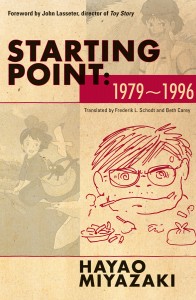
“For those who enjoy the process and precision behind an art, Starting Point is a rare glimpse into an often-times enigmatic industry.” (VIZ Media LLC)
By Alexis Agliano Sanborn (Shimane-ken, 2009-11) for JQ magazine. Alexis is a graduate student of Harvard University’s Regional Studies—East Asia (RSEA) program, and currently works as an executive assistant at Asia Society in New York City.
Starting Point: 1979-1996, translated by Beth Cary and Frederik L. Schodt, is quite unlike its sequel, Turning Point: 1997-2008 (read JQ’s review here). Technical rather than creative, Starting Point shares renowned director Hayao Miyazaki’s recollections of his early days as an animator. The essays and interviews follow anime through production development, touching on the intricacies of character design, layout, and story adaptation. For those who enjoy the process and precision behind an art, Starting Point is a rare glimpse into an often-times enigmatic industry.
The first half of the work features essays on Miyazaki’s long hours in the studio, culture, and nature of Japan’s animation industry in the 1960s and 1970s. As Miyazaki notes, even then, anime was tied to media mix marketing. You didn’t just have manga; you had manga, then an anime, toys, merchandise, and spin-offs all fueling off each other. Says Miyazaki in a 1982 interview: “The world of anime makes its business out of themes like departing for new horizons or love, while pretending not to be conscious of [the] commercial reality.” In hindsight, these remarks prove ironic; the auteur’s Studio Ghibli having similarly succumbed to commercialization.
It isn’t just media mix that remains the same today: professional frustrations were high and work-life balance poor. Miyazaki, over the course of several essays, recounts the life of a young professional. He states: “When young, nearly all of us want to be taken seriously, as soon as possible….In fact, many of those who have not yet taken the plunge into the professional world…tend to speak endlessly about techniques, or concentrate on gaining as much knowledge as possible….In reality, however, once you enter this industry, the techniques required can be mastered very quickly.”

